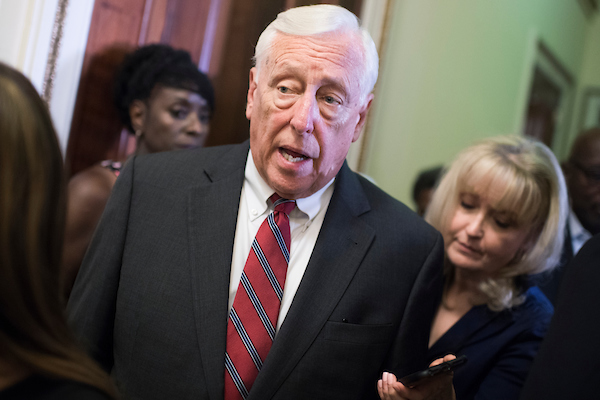Hoyer contradicts Judiciary Committee on impeachment inquiry

Updated 1:23 p.m. | House Majority Leader Steny H. Hoyer on Wednesday directly contradicted Judiciary Committee Democrats’ assertion that they’re engaged in an impeachment inquiry.
“No,” the Maryland Democrat told reporters during his weekly press briefing when asked if he thought an impeachment inquiry was underway. “I think the delineation ought to be whether or not they’re considering a resolution of impeachment.”
Since such a resolution is not currently before the committee, Hoyer said he would not characterize their proceedings as an impeachment inquiry.
[Democrats still not working off same playbook on impeachment]
“I don’t want to be simplistic about it but I don’t want to quibble on words, either,” he said.
However, there was some quibbling of words as roughly an hour after the pen and bad briefing ended Hoyer sent out a statement trying to clarify his comments.
“I thought the question was in regards to whether the full House is actively considering articles of impeachment, which we are not at this time,” he said in the statement. “The investigations by six different House Committees into the widespread dishonesty, abuses of power, and corruption in the Trump Administration are ongoing. I strongly support Chairman Nadler and the Judiciary Committee Democrats as they proceed with their investigation ‘to determine whether to recommend articles of impeachment to the full House,’ as the resolution states.”
Reporters in the briefing gave Hoyer plenty of opportunities to clarify his position. It was actually the first follow up question in which a New York Times reporter asked if he could state yes or no whether he believes the House is in an impeachment inquiry that prompted the remark mentioned above.
A Roll Call reporter also followed up later in the briefing to ask what procedure the House would need to take to formally enter an impeachment inquiry. Notably, Hoyer still did not use “impeachment inquiry” in his statement.
Hoyer’s original comments made him the first Democratic leader to offer a different interpretation than Judiciary Committee Democrats about an investigation they’ve described as an impeachment inquiry. But he also offered an explanation as to why the panel Democrats are using that phrasing.
“In using the word impeachment, we think that probably gives more latitude in discovery based upon some of the court cases,” Hoyer said.
Speaker Nancy Pelosi has not used the impeachment inquiry description, but she’s also declined to directly say the Judiciary Committee is not engaged in one. When asked Monday about Judiciary Chairman Jerrold Nadler characterizing his panel’s probe as formal impeachment proceedings, the California Democrat claimed she didn’t know what Nadler said.
“I do know that we’ve been on a path of investigation and that includes the possibility of legislation or impeachment,” she said.
Hoyer sought to align his position with Pelosi’s, saying, “The speaker and I have said on a continuing basis that we need to conduct such investigations as are necessary to determine fully the facts and whether or not further action is warranted.”
‘Reasons of discovery’
The majority leader touched on divisions within the Democratic Caucus on impeachment, admitting that some members believe there’s enough evidence against President Donald Trump to proceed with articles of impeachment now. The committee believes it needs to hear from additional witnesses and compile additional information before it takes action, he said.
“For reasons of discovery, the committee has said that one of the possible outcomes of these hearings, impeachment, gives it a broader authority on discovery, which we think is fine,” Hoyer said, offering an explanation of why the panel’s Democrats have started calling their investigation an impeachment inquiry. “But I do not think the nature of what is going on has changed. It may accelerate depending on what information the committee finds.”
The Judiciary Committee on Thursday will mark up a resolution defining procedures it can use as part of its self-proclaimed impeachment investigation.
Some committee members have said that vote could also help in courtroom fights to enforce congressional subpoenas, which could take months to resolve. That includes lawsuits to obtain Trump’s financial records and to require former White House Counsel Don McGahn to testify about details in the special counsel report about whether Trump tried to obstruct the investigation.
Ross Garber, who teaches political investigations and impeachments at Tulane Law School, said the vote on rules for an impeachment inquiry could help counter arguments from Trump’s lawyers that the House doesn’t have a legitimate legislative purpose in seeking the information.
“Here what they want to be able to say is, the House has a strong legislative purpose, namely impeachment,” Garber said.
For Hoyer, who doesn’t believe the House is currently engaged in an impeachment inquiry, he described two procedural scenarios under which they may enter one.
“The criteria would be if you’re going to be in an impeachment consideration is a resolution that is drafted under consideration by the committee and/or voted to proceed by the House,” he said. “In either event, I don’t think that’s what’s happened. We don’t think that’s what happened. And I don’t think we can explain it better than that that they’re continuing the search for truth.”
Hoyer clarified that he was not offering an official interpretation of what is needed for an impeachment inquiry to be underway.
“I’m not answering from a technical standpoint. I’m answering from my gut reaction,” he said.
Republicans believe a vote of the full House is needed to launch a formal impeachment inquiry but said Democrats aren’t proceeding with one that because they don’t have the votes.
Todd Ruger contributed to this report.





